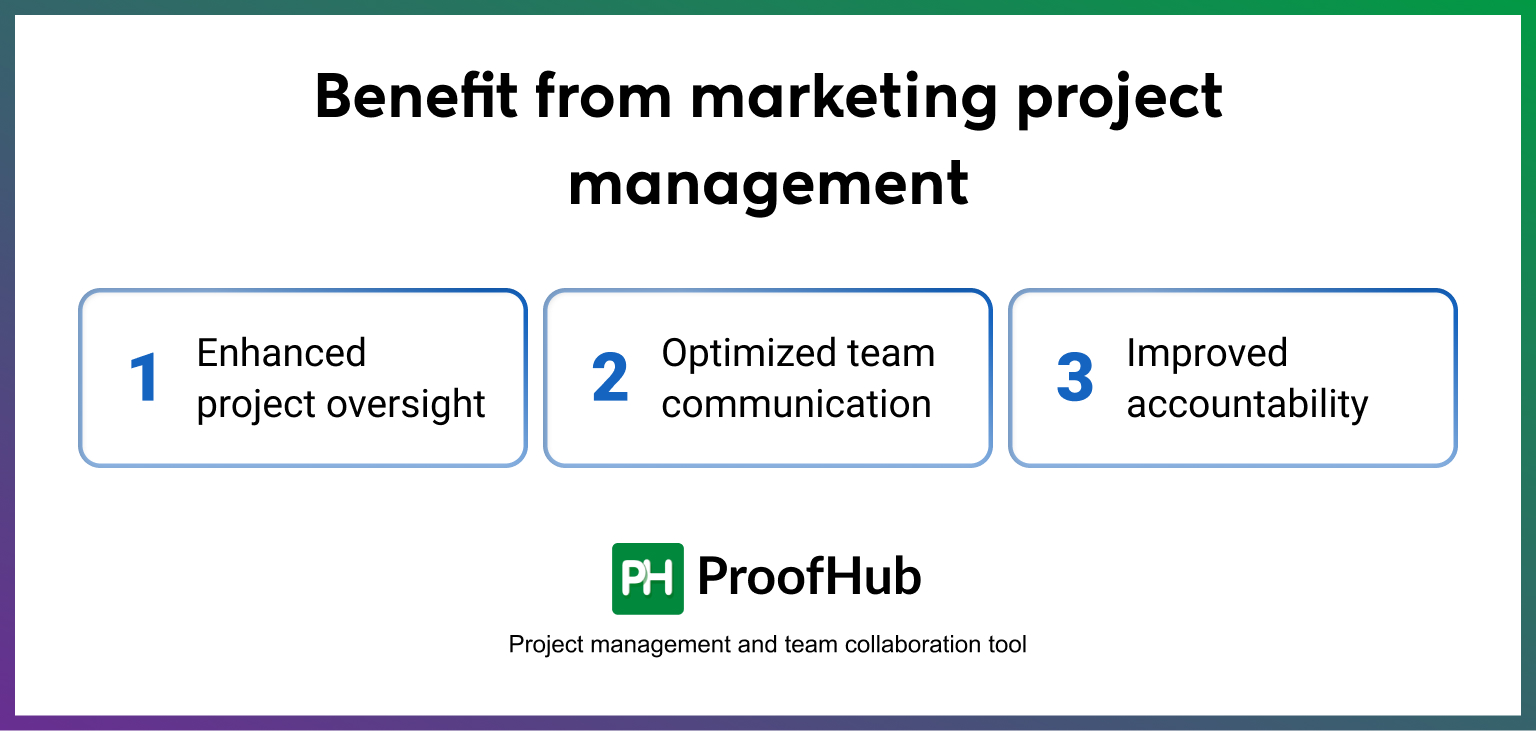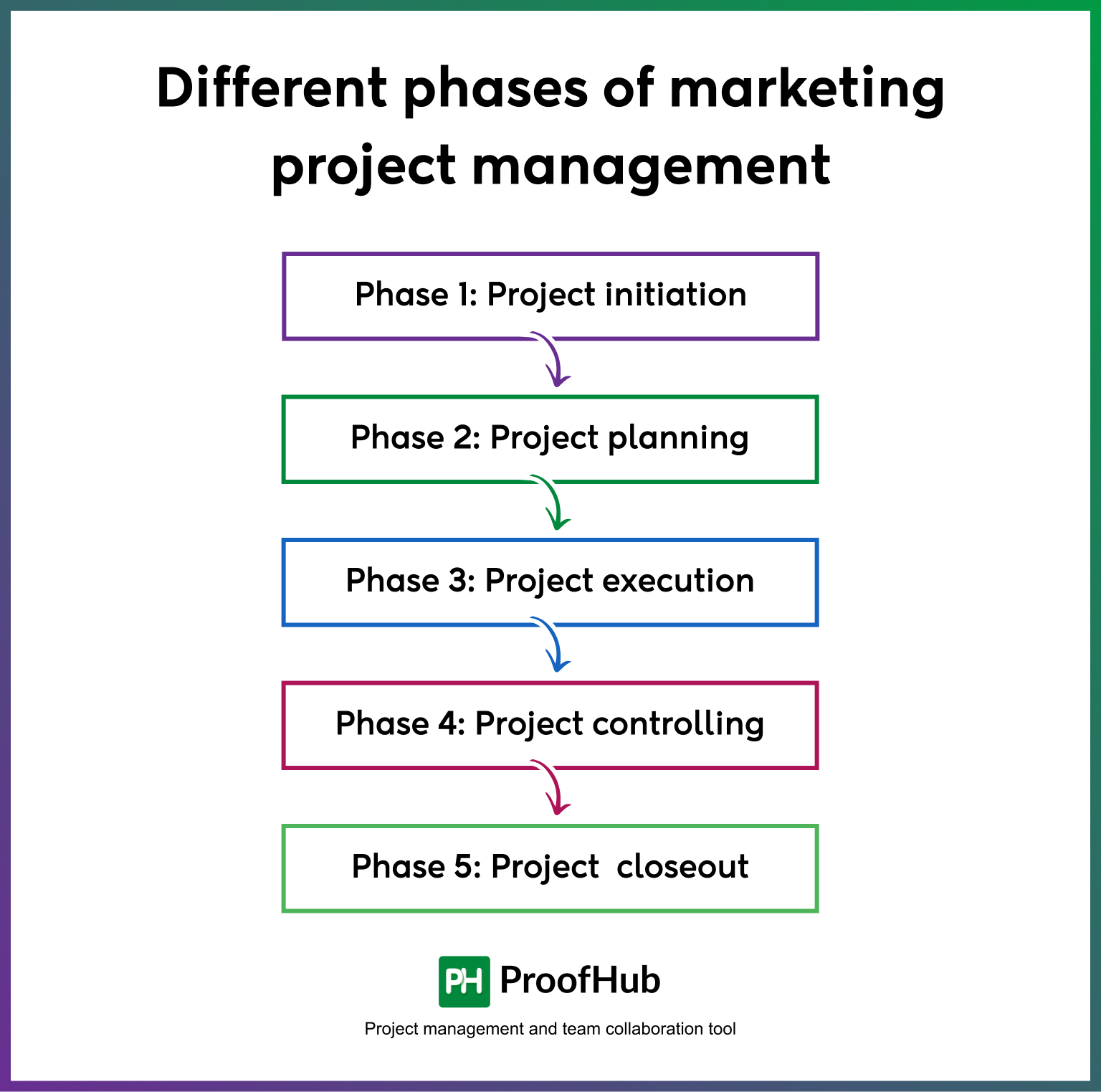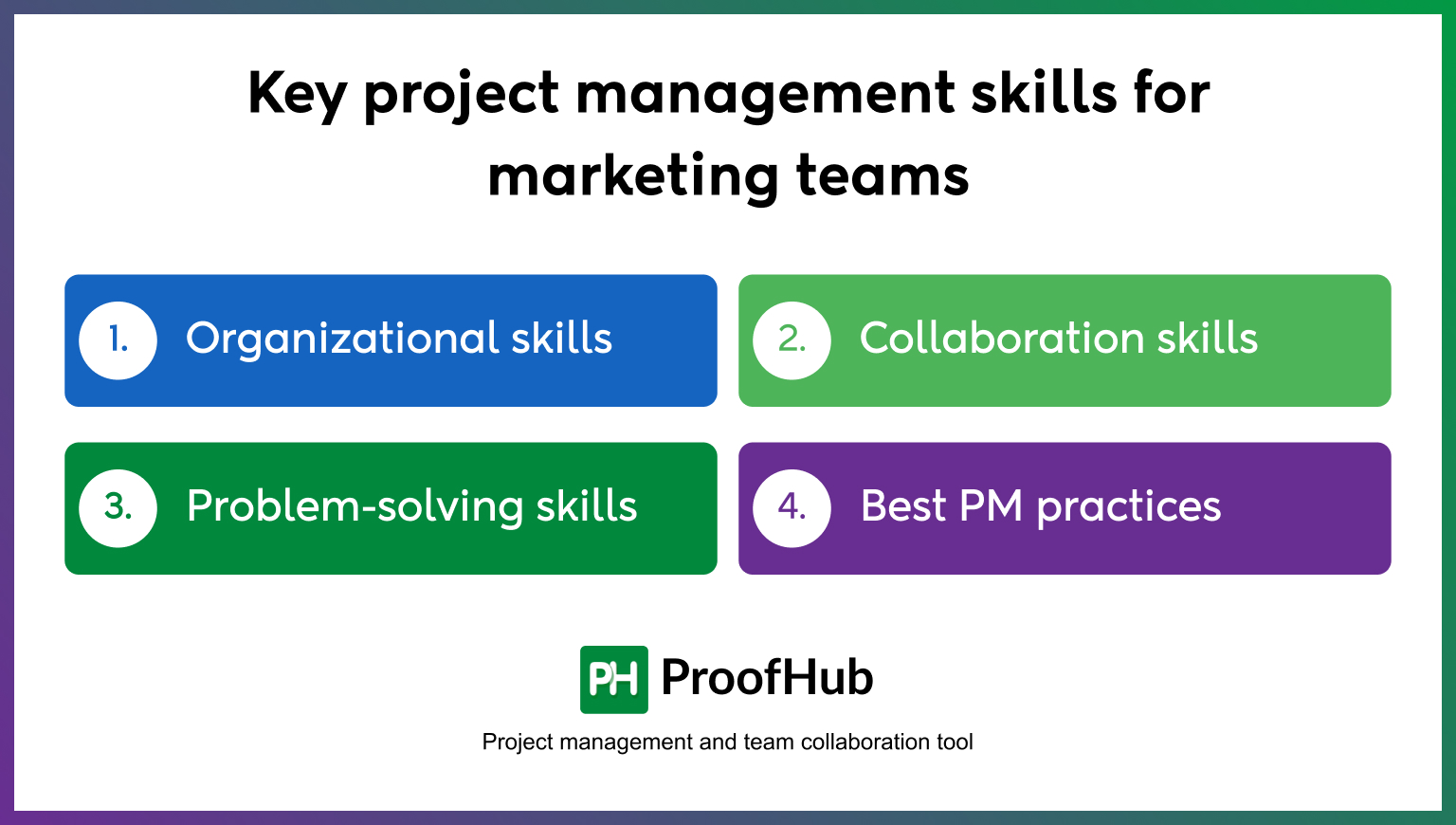Does your marketing team often find itself exhausted, stressed out, and overwhelmed in an endless pursuit of meeting deadlines and making clients happy?
If sadly, this is the case then it’s time to have a second look at your marketing project management methodology. A fresh approach is likely needed.
Surprisingly, only 1 in 4 organizations uses any kind of project management software.
In this digital age, how can businesses hope to survive and thrive without using the latest tools and technologies?
No wonder 70% of all projects fail.
And we all know about common culprits behind project failures – miscommunication, poor collaboration, missed deadlines, messy email threads, and vague job responsibilities, to name a few.
There are more to the list of reasons why projects fail.
In this comprehensive article, you will understand all you need to know about marketing project management – the definition, benefits, steps, the role of a project manager, and the best software for marketing project management available today.
What is marketing project management?
Readers should not confuse marketing project management with project management. There’s a thin yet significant line that separates both.
While project management is a general term, marketing project management is a more specific process that involves planning, execution, performance, and closure of certain tasks and goals for marketing-related campaigns. The process is drafted by a marketing project manager or marketing head.
This methodology helps to keep marketing campaigns on track and stakeholders updated at every stage of the project. Marketing project management increases productivity by guiding team members to complete campaign tasks on time, with as few errors as possible.
“ProofHub-Your one-stop solution for streamlined marketing project management. Get started for Free today!”
How do companies benefit from marketing project management?
Marketing project management helps companies and their marketing teams to streamline their processes, reduce complexities, and deliver better results as project objectives and deliverables are identified from the start.

Check out some ways companies benefit from marketing project management.
Enhanced project oversight
Marketing project management is divided into the following phases:
- Lay down project specifications to the marketing team
- Task assignment to individuals and teams
- Work monitoring
- Timely communication
- Seamless collaboration
In times when remote work has become a primary mode of work across the globe, marketing project management tools can help marketing teams with a centralized place to organize and collaborate on all creative components of a project. Such tools offer a wide range of features in one place to enable marketing leads to have improved project oversight from any location, on any device.
Optimized team communication
First remote work, and then hybrid work, have redefined the importance of open communication, with companies using different tools to enable swift communication among team members. Marketing project management ensures that no vital information falls through the cracks and that the entire campaign flows seamlessly within the team as well as across different departments.
Improved accountability
Marketing project management improves transparency and accountability within marketing teams. With improved visibility, leads and managers can find out who’s performing well and who’s struggling to deliver expected results.
What are the different phases involved in the marketing project management process?
Since every marketing project campaign is different, there cannot be a ‘one-size-fits-all’ approach to managing them. However, irrespective of industry, most projects involve five lifecycle phases which are as follows.

1. Initiation
Project initiation is a phase that involves analysis, discussion, and decision-making. You identify a business’s pain points and a potential solution. You will assess the process to execute a solution and justify the need for the project to leadership to get a go-ahead approval.
For example, a QA (quality analyst) team at a software company has proposed adding a new “dark theme” feature to the product that will enhance the user experience. The development team at the company has a solution and needs the approval to start the project. This leads to the initiation phase that covers the following steps:
- Conduct a feasibility study
- Identify the project scope
- Define project deliverables
- Identify project stakeholders
- Create the business case
- Write a Statement of Work
2. Planning
Marketing project management planning is a phase where the work discussed during initiation is divided into smaller, manageable chunks. Tasks are defined, the project team is formed, job roles and responsibilities are assigned, and the project schedule is created. Here are some steps that you’ll take:
- Design the project plan and timeline
- Allocate the budget
- Choose your resources and form a team
- Hold a kickoff meeting and get everyone aligned on the project goals
3. Execution
In this phase, the team executes its plan. Marketing managers will be communicating with resources, keeping a close on the timeline and budget, and reporting to stakeholders. Marketing project managers are responsible for creating, tracking, and reporting on tasks, and taking action when projects aren’t progressing as planned. You can use Kanban boards to track the current status of tasks and identify potential roadblocks to taking timely action.
Some steps you’re likely to take during this phase are:
- Hold regular, daily, or weekly, team meetings where you ask everyone to share task updates
- Conduct team-building activities
- Release regular communications
4. Controlling
Now that your project is in full swing, you need to make sure that it stays on track, as close to the plan you created. The controlling phase is where you’ll oversee any part that is making the project deviate off track. This is where a tool like ProofHub can help you visualize your entire project and all team members.
The project manager is responsible for identifying issues and intervening on time. Communicating with team members and project stakeholders holds the key here, and here ProofHub can save the day with thoughtful communication features in one place. In this stage, you will:
- Conduct weekly budget reviews
- Communicate with clients to make sure Scope Creep does not matter
- Provide regular status reviews to stakeholders and answer any questions
5. Closeout
The Closeout phase is when you reach the end of the project. Marketing project managers evaluate the performance of the project through client feedback and internal analysis of the project.
For example, ProofHub allows you to track billable hours, budget, individuals, and project performance to assess overall performance. Here are some steps you will take during this phase:
- Document project completion
- Hold a post-mortem meeting
- Analyze the performance
- Create a project review and report that outlines lessons learned from the mistakes of the project
- Do a final budget review
“Empower your marketing team with a suite of powerful tools in one place. Request a demo TODAY!”
What does a marketing project manager do?
The role of a marketing project manager is to lead the project and the team right from the beginning to the very end – from project ideation to execution, and finally debriefing and reporting. The marketing project manager implements the vision created by the marketing director and chief marketing officer.
The Marketing project managers start their work early on in the project lifecycle by determining the SOW (scope of work) and looking after market research on the target audience.
As the project progresses, their roles and responsibilities expand as they assign tasks, set deadlines, and determine the project’s budget, and resource allocation requirements while maintaining seamless communication with internal and external stakeholders.
Key project management skills for marketing teams

Marketing teams need to develop project management skills to implement project management effectively. While some skills (personality traits) are innate and typically can’t be caught, other skills (soft skills) can be honed and improved.
There’s a lot more to project management than allocating and tracking tasks. Let’s take a look at some key skills to develop for marketing teams to ace project management.
- Organizational skills. The project management software you use can help you organize your work but there are certain skills, like task prioritization and employee time management, that you should be adept in individually.
- Collaboration skills. Marketing teams need to have smart collaboration skills to avoid any confusion, miscommunication, and vagueness surrounding job roles and responsibilities. Timely communication is critical to ensure seamless collaboration among widely dispersed teams.
- Problem-solving skills. Problems and projects go hand in hand. Marketing teams should be able to quickly identify problems and come up with effective solutions. The best you can do to solve problems is to get together as a team and encourage everyone to put forth their potential solutions. The final decision should be made unanimously.
- Best project management practices. Having a knowledge of the best project management practices and incorporating them can help you deliver successful projects with amazing consistency.
What is marketing project management software?
Marketing project management software is designed to enable marketing teams to better plan, organize, collaborate, and execute marketing projects through a suite of features. This type of software assists marketing teams with streamlining workflows, smart task management, time tracking, digital file management, swift communication, project scheduling, note-making, online proofing, and more. It supports integration with third-party applications your team already uses.
The right marketing project management software is capable of replacing various other apps you’ve been using to manage your marketing projects. It’s likely that you are using separate tools for file management, time tracking, communication, note-making, etc.
Marketing project management offers the maximum required functionalities in one platform.
It’s surprising that amid ever-changing project deliverables and deadlines, many creative and marketing teams still undermine the importance of using easy-to-use, customizable, and feature-rich marketing project management software.
Still relying on tedious, repetitive manual tasks, and long email threads to do the job for you? Guess what. You need to put your thinking cap on.
Yes, I know you have a highly motivated, skillful marketing team that has been delivering expected results consistently for you and your organization. You tell yourself that no matter how complex the project is, you have the team to do it for you.
However, you need to make some changes to this line of thought.
Consider this: project management software is easily the most crucial asset you can have in your digital marketing arsenal. The following stats validate this statement.
- Organized marketers are 397% more likely to achieve success.
- Marketers who plan and monitor projects are four times more likely to report being successful.
- Project management issues cost businesses $109 million for every $1 billion invested in a project!
- The percentage of organizations using spreadsheets for project management lowered from 66% in 2018 to 46.1% in 2020.
How can you get started with marketing project management software?
Simple! Invest in the best marketing project management software.
Now, the question that arises is which marketing project management software to use.
The market is flooded with some tried and tested products, like Basecamp, Asana, Trello, Teamwork, etc. However, if you want your marketing team to ace marketing project management then you need not go further than one power tool that overshadows them all – ProofHub.
ProofHub offers an impeccable combination of high functionality, flexibility, ease of usage, and competitive pricing. Something that you won’t find anywhere else. Don’t believe me? Let me illustrate this fact through the following five use cases:
- Avoid lost work requests and support queries: Get your marketing team to run daily functions smoothly and jumpstart projects effectively through request forms to track work requests and support queries.
- Avoid confusion in job roles: Use ProofHub’s smart task management to assign and prioritize tasks, set timeframes, and monitor their progress at every stage with Kanban view, Table view, and Gantt view.
- Avoid Scope Creep: Use Gantt charts to effectively plan and visualize the outcomes. Gantt chart dependencies allow users to adjust any new changes or developments in a project.
- Empower teams to self-manage: Use Kanban boards to divide tasks into workflow stages to allow teams to self-manage through drag-and-drop functionality.
- Ensure swift communication: ProofHub’s advanced communication features, like instant chat, discussions, @mentions, and real-time updates enable marketing teams to exchange crucial information with each other, clients, and other stakeholders.
Is there any other marketing project management software that offers more bang for the buck than ProofHub?
We like to believe- NO!
ProofHub is designed to empower marketing teams of any size, across various industries, to take their project management to the next level without overburdening themselves.
Ready to give it a try? Get started with a free 14-day trial today!
FAQs
What makes a good marketing project manager?
A good marketing project managers is one who trusts team members to do their job efficiently without resorting to micromanagement.
What are the top 5 project management apps?
Top five project management apps are: ProofHub Asana Basecamp Trello Teamwork
What are the 4 types of project management?
Four types of project management are: Agile Waterfall Lean Scrum

